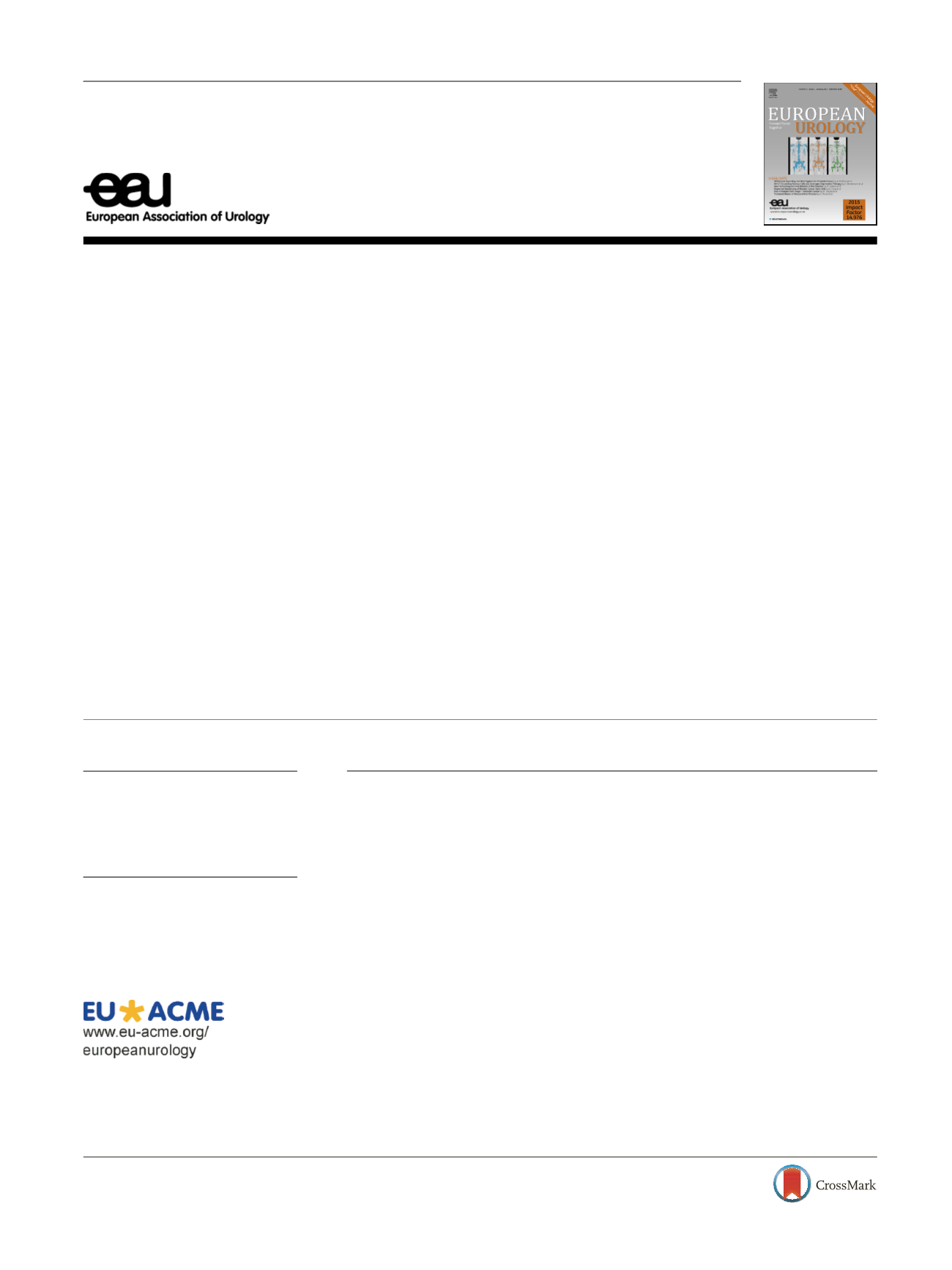

Platinum Priority – Review – Voiding Dysfunction
Editorial by Soo Jeong Kim, Omar Al Hussein Alawamlh and Richard K. Lee on pp. 770–771 of this issue
Medical Treatment of Nocturia in Men with Lower
Urinary Tract Symptoms: Systematic Review by the
European Association of Urology Guidelines Panel for
Male Lower Urinary Tract Symptoms
Vasileios I. Sakalis
a[8_TD$DIFF][1_TD$DIFF]
,Markos Karavitakis
b[9_TD$DIFF]
,Dina Bedretdinova
c[10_TD$DIFF]
,Thorsten Bach
d[11_TD$DIFF]
,J.L.H. Ruud Bosch
e[12_TD$DIFF]
,Mauro Gacci
f[13_TD$DIFF]
,Christian Gratzke
g[14_TD$DIFF]
,Thomas R. Herrmann
h[15_TD$DIFF]
,Stephan Madersbacher
i[16_TD$DIFF]
,Charalampos Mamoulakis
j[17_TD$DIFF]
,Kari A
[18_TD$DIFF]
.O. Tikkinen
k[19_TD$DIFF]
,Stavros Gravas
l[20_TD$DIFF]
, * ,Marcus J. Drake
ma
[2_TD$DIFF]
Department of Urology, Salisbury District Hospital, Salisbury, UK;
[21_TD$DIFF]
b
Center of Minimal Invasive Urology Athens Medical Center, Athens, Greece;
[10_TD$DIFF]
c
French
Institute of Health and Medical Research, Paris, France;
[11_TD$DIFF]
d
Department of Urology, Asklepios Hospital Harburg, Hamburg, Germany;
[12_TD$DIFF]
e
Department of Urology,
University Medical Centre Utrecht, Utrecht, The Netherlands;
[22_TD$DIFF]
f
Minimally
[23_TD$DIFF]
Invasive
[24_TD$DIFF]
and Robotic Surgery, and Kidney Transplantation, University of Florence
AOUC- Careggi Hospital, Florence, Italy;
[14_TD$DIFF]
g
Department of Urology, Ludwig-Maximilians-University, Munich, Germany;
[15_TD$DIFF]
h
Urology and Urological Oncology,
Hanover Medical School, Hanover, Germany;
[16_TD$DIFF]
i
Department of Urology, Kaiser-Franz-Josef-Spital, Vienna, Austria;
[17_TD$DIFF]
j
Department
[27_TD$DIFF]
of Urology, University General
Hospital of
[28_TD$DIFF]
Heraklion,
[29_TD$DIFF]
University of Crete Medical School,
[30_TD$DIFF]
Heraklion, Crete, Greece;
k
Departments
[36_TD$DIFF]
of Urology and
[37_TD$DIFF]
Public Health, University of
[38_TD$DIFF]
Helsinki and
Helsinki
[39_TD$DIFF]
University Hospital, Helsinki, Finland;
[42_TD$DIFF]
l
Department of Urology, Faculty of Medicine, School of Health Sciences, University of Thessaly, Larissa, Greece;
[43_TD$DIFF]
m
Department
[44_TD$DIFF]
of Urology, University of Bristol, Bristol Urological Institute, Southmead Hospital,
[45_TD$DIFF]
Bristol,
[46_TD$DIFF]
UK
E U R O P E A N U R O L O G Y 7 2 ( 2 0 1 7 ) 7 5 7 – 7 6 9ava ilable at
www.sciencedirect.comjournal homepage:
www.eu ropeanurology.comArticle info
Article history:
Accepted June 4, 2017
Associate Editor:
Jean-Nicolas Cornu
Keywords:
Nocturia
LUTS
Desmopressin
IPSS
Guidelines
Please visit
www.eu-acme.org/ europeanurologyto read and
answer questions on-line.
The EU-ACME credits will then
be attributed automatically.
Abstract
Context:
The treatment of nocturia is a key challenge due to the multi-factorial patho-
physiology of the symptom and the disparate outcome measures used in research.
Objective:
To assess and compare available therapy options for nocturia, in terms of
symptom severity and quality of life.
Evidence acquisition:
Medical databases (Embase, Medline, Cochrane Systematic
Reviews, Cochrane Central) were searched with no date restriction. Comparative studies
were included which studied adult men with nocturia as the primary presentation and
lower urinary tract symptoms including nocturia or nocturnal polyuria. Outcomes were
symptom severity, quality of life, and harms.
Evidence synthesis:
We identified 44 articles. Antidiuretic therapy using dose titration
was more effective than placebo in relation to nocturnal voiding frequency and duration
of undisturbed sleep; baseline serum sodium is a key selection criterion. Screening for
hyponatremia (
<
130 mmol/l) must be undertaken at baseline, after initiation or dose
titration, and during treatment. Medications to treat lower urinary tract dysfunction (
a
-
1 adrenergic antagonists, 5-
a
reductase inhibitors, phosphodiesterase type 5inhibitor,
antimuscarinics, beta-3 agonist, and phytotherapy) were generally not significantly
better than placebo in short-term use. Benefits with combination therapies were not
consistently observed. Other medications (diuretics, agents to promote sleep, nonste-
roidal anti-inflammatories) were sometimes associated with response or quality of life
improvement. The recommendations of the Guideline Panel are presented.
[51_TD$DIFF]
* Corresponding author.
[52_TD$DIFF]
Department of Urology, Faculty of Medicine, School of Health Sciences,
University of Thessaly, 6–8 Feidiou, Larissa 41221, Greece.
[53_TD$DIFF]
Tel.: +
[54_TD$DIFF]
30 694 462 6086.
E-mail address:
sgravas2002@yahoo.com(S. Gravas).
http://dx.doi.org/10.1016/j.eururo.2017.06.0100302-2838/
#
2017 European Association of Urology. Published by Elsevier B.V. All rights reserved.
















